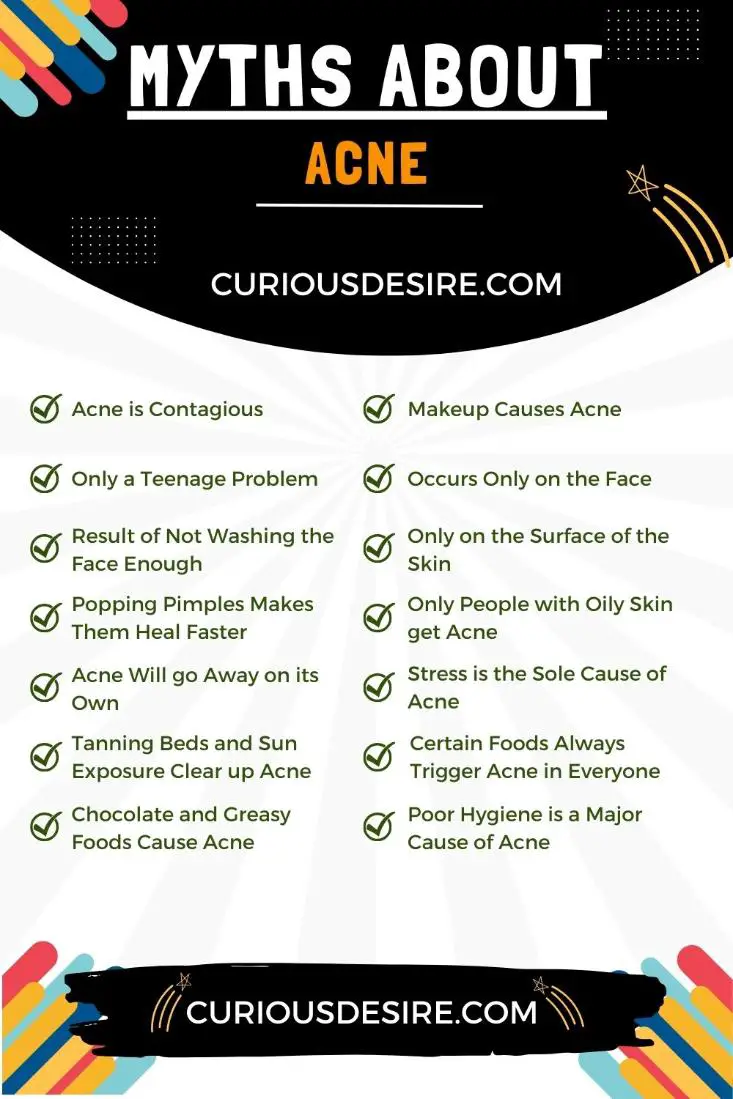Acne is a common skin concern that affects millions of people worldwide. While it can be frustrating and embarrassing, it’s important to remember that you’re not alone.
Unfortunately, there are also many myths and misconceptions surrounding acne that can lead to ineffective treatment and even worsen the problem.
From the influence of diet to the depth of its impact, we aim to provide clarity on these misconceptions, fostering a better understanding of acne beyond the surface-level assumptions
5 Most Common Myths About Acne:
- Poor Hygiene is a Major Cause of Acne
- Acne is Contagious
- Makeup Causes Acne
- Acne is Only on the Surface of the Skin
- Stress is the Sole Cause of Acne

Myth 1: Chocolate and Greasy Foods Cause Acne
Why is it believed:
This myth has gained popularity due to a combination of cultural beliefs, anecdotal experiences, and a desire for straightforward explanations.
Culturally, there exists a common perception that certain foods, especially indulgent ones like chocolate and greasy foods, are linked to skin issues.
Anecdotal experiences, where individuals notice certain conditions after consuming such foods, contribute to the reinforcement of this belief.
A study was done related to Acne, which found that 71% of people believe that Acne is due to the consumption of oily food, although they do not have any proof for their beliefs. Chocolate and greasy foods are often associated with a “junk food” diet, due to which people may believe it to be detrimental to skin health.
Busting the Myth:
Scientific evidence does not uniformly support the direct causation between chocolate or greasy foods and acne. While diet can influence acne in some cases, the impact varies greatly between individuals.
While personal experiences may suggest a link, acne development is a multifaceted process influenced by various factors such as genetics, hormonal fluctuations, and overall skincare practices.

Myth 2: Poor Hygiene is a Major Cause of Acne
Why is it believed:
People believe that acne is caused by dirt and bacteria on the skin’s surface. Frequent scrubbing and harsh products are seen as a way to quickly eliminate the dirt and oil from the skin, and achieve clear skin.
The misconception that poor hygiene leads to acne is grounded in a simplistic understanding of skin health.
Cultural norms often associate clear skin with cleanliness, contributing to the widespread belief that inadequate hygiene is a primary cause of acne.
Busting the Myth:
Acne is not solely determined by hygiene practices. Clogged pores are the primary cause of acne, and these are mainly influenced by internal factors like hormones and oil production, not just surface dirt.
Over-cleansing or scrubbing too harshly can strip the skin of its natural oils, leading to increased irritation and potentially worsening acne. Effective skincare involves a balanced routine, emphasizing gentle cleansing without excessive scrubbing.
Myth 3: Tanning Beds and Sun Exposure Clear up Acne
Why is it believed:
The belief that tanning beds and sun exposure can clear up acne originates from the temporary improvement often noticed after spending time in the sun. Sunlight can dry out the skin, providing a short-term solution.
Additionally, there’s a common misconception that the sun’s rays have inherent healing properties for skin conditions, leading to the belief that tanning can be an effective remedy for acne.
The hope for a fast and easy solution to acne can lead people to believe tanning is a viable option
Busting the Myth:
While sun exposure may offer temporary relief by masking acne, it is not a recommended long-term solution.
UV radiation can damage the skin, triggering inflammation and potentially worsening acne over time.
The apparent improvement is often cosmetic and can lead to long-term skin damage promoting inflammation, premature aging, hyperpigmentation and potentially leading to scarring.

Myth 4: Acne is Only a Teenage Problem
Why is it believed:
Acne is exclusive only to teenagers arises of the prevalence of acne during adolescence due to hormonal changes, and believed that once passed the teen years acne will not be a problem.
Cultural narratives reinforce this idea, portraying acne as a temporary phase that vanishes once the teenage years are left behind
Busting the Myth:
Acne is not restricted just to adolescence. While hormonal changes play a significant role in teenage acne, adults can also grapple with skin issues due to stress, hormonal imbalances, and genetic predispositions.
Viewing acne as a concern solely for teenagers oversimplifies the complexities of its causes and perpetuates an incomplete understanding of skincare.
Myth 5: Stress is the Sole Cause of Acne
Why is it believed:
The belief that stress is the exclusive cause of acne simplifies the complex interplay of factors contributing to skin issues.
Stress is a known trigger for hormonal changes, and it’s easy to associate heightened stress levels with breakouts, leading to the misconception that stress alone is the primary culprit. This myth suggests that managing stress alone is the key to achieving clear skin.
Busting the Myth:
While stress can aggravate acne by triggering hormonal changes, it is not the sole factor. Hormones, genetics, and lifestyle choices also play significant roles in the development of acne.
Recognizing the complex nature of acne helps dispel the oversimplified notion that stress alone is responsible.
Myth 6: Popping Pimples Makes Them Heal Faster
Why is it believed:
Popping the pimples accelerates the healing process and is rooted in a desire for a quick solution to this problem. Some may think that by releasing trapped pus, the blemish will heal faster, and the skin will return to its clear state sooner.
This belief is perpetuated by a lack of understanding about the consequences of this common skincare habit.
Busting the Myth:
In reality, popping pimples can do more harm than good. It increases the risk of infection, inflammation, and scarring.
The body’s natural healing process is often more effective if blemishes are left untouched. Understanding the potential consequences of this myth is crucial for promoting healthy skincare habits and preventing long-term damage.
Myth 7: Acne is Contagious
Why is it believed:
The misconception that acne is contagious likely arises from a misunderstanding of its causes. Acne is often visible and noticeable, leading to the unfounded fear that physical contact with someone who has acne or sharing personal items could transmit the condition.
This belief overlooks the internal and genetic factors that predominantly contribute to acne development.
Busting the Myth:
Physical contact with someone who has acne or sharing personal items does not lead to the transmission of acne. Understanding the true nature of acne helps dispel unnecessary fears and promotes informed skincare practices.
Acne is not contagious. It is a skin condition influenced by various internal factors such as genetics, hormonal changes, and external factors like skincare practices.
Realizing that acne is not contagious allows for a more accurate understanding of its origins and encourages supportive attitudes toward individuals dealing with this common skin condition.
Myth 8: Only People with Oily Skin get Acne
Why is it believed:
People widely consider that individuals with naturally oily skin are highly prone to acne. It is because they do not have the correct information related to this medical condition.
Oily skin is commonly associated with excess oil production, and the assumption is that this excess oil is the sole cause of acne. This oversimplification contributes to the misconception that individuals with dry or combination skin are immune to acne.
Busting the Myth:
Acne can affect people with all skin types, including those with dry or combination skin. It’s not solely about oiliness other factors like genetics, hormonal fluctuations, and environmental influences play crucial roles.
Dismissing the myth involves recognizing that acne is not a simple condition that can manifest in individuals with varying skin types.
Understanding that acne is not exclusive to one skin type allows for a more inclusive approach to skincare. Tailoring routines to individual needs, rather than making assumptions based on skin type, is essential for effective acne management.
Myth 9: Makeup Causes Acne
Why is it believed:
Some makeup products, especially those with heavy ingredients or comedogenic properties, are considered to clog pores and contribute to breakouts.
Breakouts may have been observed in individuals after using specific makeup products. The application and removal of makeup can potentially spread bacteria, contributing to the misconception that all makeup is harmful to skin health and poses problems for the skin. This is due to the lack of awareness about non-comedogenic options and proper skincare practices.
Busting the Myth:
While some makeup products can be comedogenic and contribute to clogged pores, the key lies in making informed choices.
Many cosmetic brands offer non-comedogenic options designed to minimize the risk of breakouts. Additionally, practicing thorough makeup removal before bedtime helps prevent the accumulation of residues that could lead to acne.
A proper understanding is required that makeup itself is not universally harmful; it’s about selecting products wisely and incorporating effective cleansing into one’s skincare routine.
Myth 10: Acne Will go Away on its Own
Why is it believed:
Acne is considered to naturally disappear with time. Some individuals may experience periods of clear skin without treatment, leading to the belief that acne is self-resolving and that all forms of acne are self-limiting and require no specific treatment.
Also, concerns about potential side effects or the inconvenience of treatment can lead individuals to avoid seeking professional help.
Busting the Myth:
While mild cases might resolve spontaneously, leaving moderate to severe acne untreated can lead to scarring, inflammation, and a worsening of symptoms over time.
Timely and appropriate interventions, such as skin care products or dermatological procedures, can significantly improve outcomes. Taking proactive measures is necessary and can positively impact the course of acne and prevent potential complications.
Myth 11: Acne is a Result of Not Washing the Face Enough
Why is it believed:
Some people believe that if you don’t wash your face a lot, dirt piles up and causes acne, thinking that washing more means fewer pimples. It’s an idea that says acne happens because your face isn’t super clean all the time.
This myth oversimplifies the complex factors contributing to acne and equates cleanliness directly with the prevention of breakouts.
Busting the Myth:
The relationship between face washing and acne is more nuanced than mere frequency. Overwashing or using harsh cleansers can disrupt the skin’s natural balance, exacerbating acne.
Effective skincare involves a balanced approach that considers individual skin needs, emphasizing gentle cleansing. For proper care of Acne, it is important to understand that a thoughtful and moderate cleansing routine is key, promoting skin health without unnecessary aggression.
Myth 12: Acne Occurs Only on the Face
Why is it believed:
The occurrence of Acne is exclusive only to the face is a common myth that is represented in the media and popular culture. Facial acne is prominently featured in skincare advertisements and movies, contributing to the perception that acne is a problem confined to the face only.
This misconception neglects the possibility of breakouts on other parts of the body.
Busting the Myth:
Acne can occur on various parts of the body, including the chest, back, shoulders, and neck. It’s not confined to facial skin, emphasizing the need for comprehensive skincare practices.
Truth is, acne can show up on your neck, chest, back, and shoulders too! It’s not just a face thing. Knowing this opens the door to better skin care for all parts of your body. So, let’s ditch the face-only myth and embrace a more inclusive approach to keeping our skin happy.

Myth 13: Certain Foods Always Trigger Acne in Everyone
Why is it believed:
The belief that some specific foods trigger acne often arises from generalizations and simplified assumptions.
People might hear stories about someone breaking out after eating a particular food and then think that this food is a guaranteed acne culprit for everyone. It’s easier to think that if a particular food causes breakouts for one person, it must do the same for everyone.
It’s a common oversimplification of the complex relationship between diet and skin health and there is no authentic information behind this myth.
Busting the Myth:
However, the relationship between diet and acne is highly individualized. Foods that may affect one person’s skin might not have the same impact on someone else.
Genetics, hormonal variations, and overall dietary patterns differ among individuals. Debunking this myth involves recognizing the uniqueness of each person’s response to food, emphasizing the need for a personalized approach to managing acne
Myth 14: Acne is Only on the Surface of the Skin
Why is it believed:
Acne is primarily seen as pimples and blackheads, leading to the belief that the condition is confined to the surface of the skin.
Since acne breakouts are apparent on the outer layer of the skin, it leads people not to be aware of the complex interplay of hormones, oil production, and bacteria that occurs within the skin’s layers.
Busting the Myth:
Acne involves complex processes beneath the skin’s surface, including clogged pores, inflammation, and bacterial activity. It’s not just a surface-level problem; it has deeper roots in the skin’s structure and may require targeted treatments to address underlying issues.
Understanding acne as more than a superficial concern allows for a holistic approach to its management, addressing both the visible symptoms and the underlying factors.
Acne Myths FAQs
1. What causes acne?
Excess oil production, clogged hair follicles, bacteria, hormonal fluctuations, and inflammation contribute to acne. Genetics and lifestyle factors also play a role.
2. Is poor hygiene a direct cause of acne?
While keeping the skin clean is crucial, poor hygiene alone is not a major cause of acne. Over-cleansing or harsh scrubbing can worsen acne; effective skincare involves a balanced and gentle cleansing routine.
3. Can chocolate and greasy foods trigger acne?
Scientific evidence does not universally support the idea that chocolate or greasy foods directly cause acne. Genetics, hormonal changes, and other factors play significant roles in breakouts.
4. Is acne only a problem for teenagers?
No, acne can affect individuals of all ages. While common in adolescence due to hormonal changes, adults can also experience acne due to stress, hormonal fluctuations, and genetics.
5. Does stress cause acne?
While stress can contribute to acne by triggering hormonal changes, it is not the sole cause. Hormones, genetics, and other lifestyle factors also play significant roles in acne development.
6. Is it true that makeup causes acne?
Makeup itself may not cause acne, but certain products can be comedogenic and contribute to clogged pores. Choosing non-comedogenic products and proper makeup removal can prevent breakouts.
7. Can acne be treated at home, or is professional help necessary?
Mild acne can be managed with over-the-counter products and a consistent skincare routine. However, moderate to severe cases may require professional intervention. Consulting with a dermatologist can determine the most effective treatment plan.